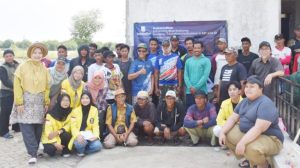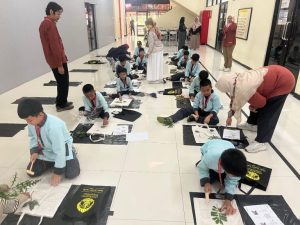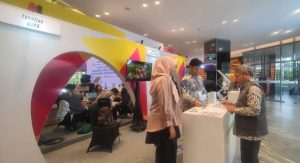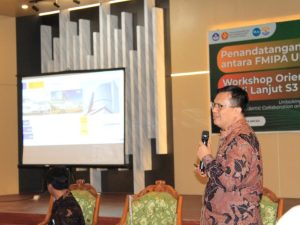|
FMIPA UI Introduces Ecoprinting to SDIT Raflesia Students: Learning Biology Through Living Art
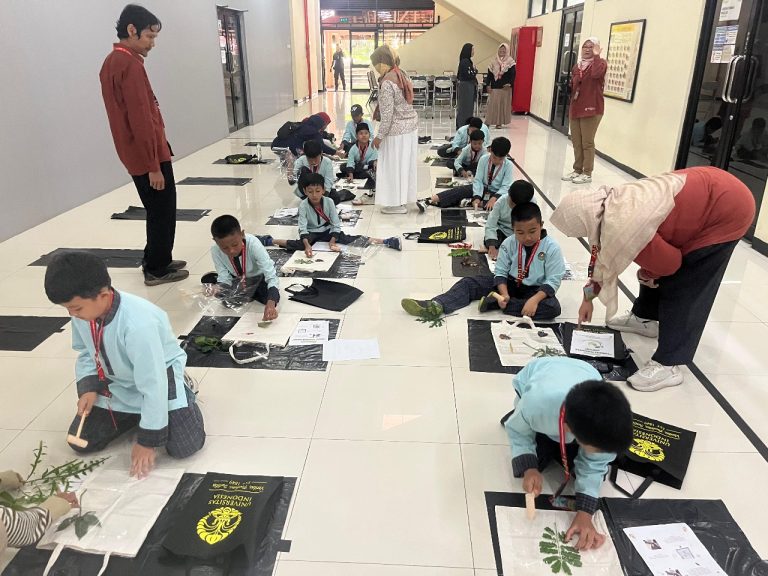
A different atmosphere could be seen on Saturday morning (October 11, 2025) at the Department of Biology, Faculty of Mathematics and Natural Sciences, Universitas Indonesia (FMIPA UI). Among the trees and laboratory rooms usually filled with university students, 33 representatives of Grade 2 and Grade 4 students from SDIT Raflesia Depok were busy observing rows of fresh leaves neatly arranged on the tables. They were not merely visiting; they came to learn biology through a method rarely encountered in their classrooms—ecoprinting.
The activity is part of the Community Service (pengmas) program of the Department of Biology, FMIPA UI, which carries the theme “Ecoprinting as an Educational Strategy to Introduce Bioprospecting and Conservation Efforts.” Through this program, the pengmas team, led by Dr. Ade Irma Elvira, S.P., M.Sc., aims to encourage students to experience biology learning that is connected to real life, creative, and still scientific.
Ecoprinting, a technique of imprinting leaf and flower patterns onto fabric, became the main learning medium of the day. By touching and directly observing various plant parts, the students were introduced to leaf structures, different types of plants, natural dyes, and broader concepts related to biodiversity.
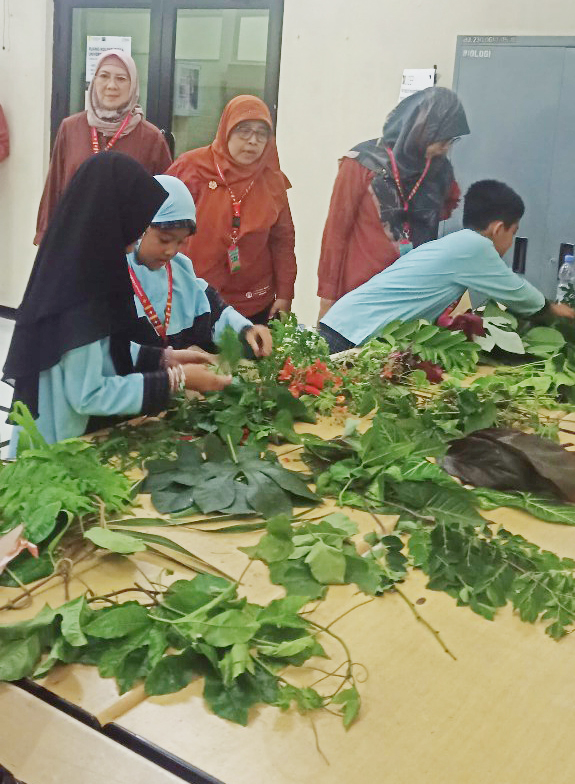
This method was chosen for a reason. Dr. rer. nat. Yasman, M.Sc., the speaker and Head of the Master’s Program in Marine Science at FMIPA UI, explained that ecoprinting allows students to experience scientific processes firsthand. “An exploration-based approach helps children understand biological concepts more easily. They learn by touching, observing, and practicing,” he said.
The community engagement activity of the Department of Biology was opened by Prof. Anom Bowolaksono, Head of the Department of Biology, FMIPA UI, who emphasized the importance of fostering an interest in science from an early age. “Introducing biology should be enjoyable without losing the essence of science. We want the younger generation to grow accustomed to thinking critically and appreciating scientific processes,” he said.
One of the key messages of this activity was to introduce the concept of bioprospecting as an effort to explore biological potential that can be sustainably developed into useful products. Through ecoprinting, the students learned that plants are not only visually beautiful but also contain natural pigments that can be utilized without harming the environment.
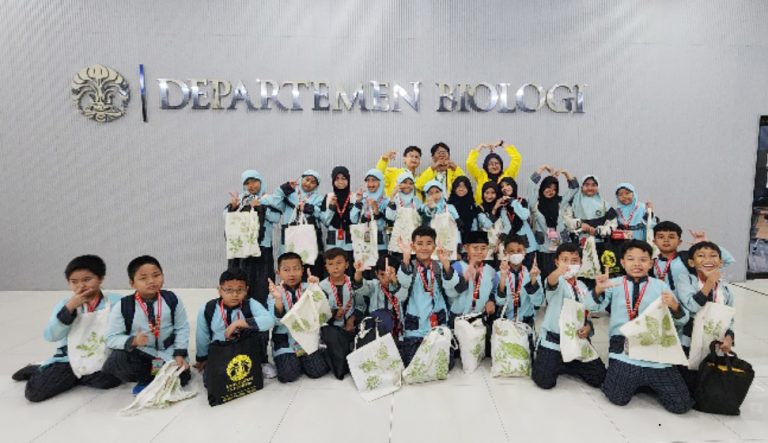
Dr. rer. nat. Yasman, M.Sc., explained various types of Indonesian plants that have potential as natural dyes. Using a simple approach, the students were guided to understand that Indonesia’s biodiversity is not only meant to be appreciated but also must be preserved for sustainability. This approach proved effective, making concepts that might seem abstract now feel tangible to the students.
Conservation values became a key pillar of this activity. The students were taught that utilizing plants must be done wisely: not taking too much, avoiding habitat destruction, and always respecting the existence of every living being were messages consistently emphasized throughout the activity.
The most enjoyable part for the participants was the hands-on session. The children selected a variety of leaves, such as Japanese swamp leaves, hibiscus, various ferns, passion fruit, cassava, croton, colored taro, peacock flower, red dadap, melon, lamtoro, lempuyung, syngonium, miana, srigading, and many other plants from the surroundings of the Department of Biology, FMIPA UI. They freely arranged patterns and then witnessed firsthand how pressure and natural dyes created unique designs on the fabric.
Cheers erupted when the ecoprinting results began to appear. “We didn’t expect science activities to be this fun!” said Anindita Nailah Puteri, one of the students, while proudly showing her work. Expressions of pride and satisfaction were clearly visible on their faces.
According to Dr. Oriza Savitri Ariantie, M.Si., deputy coordinator of the activity, the entire program ran smoothly and was well understood by the students. The collaboration among lecturers, university students, administrative staff, and SDIT Raflesia teachers was cited as the key to the program’s success.
The school also expressed great appreciation. For them, ecoprinting is not just an art activity but an effective means of fostering environmental awareness and nurturing creativity.
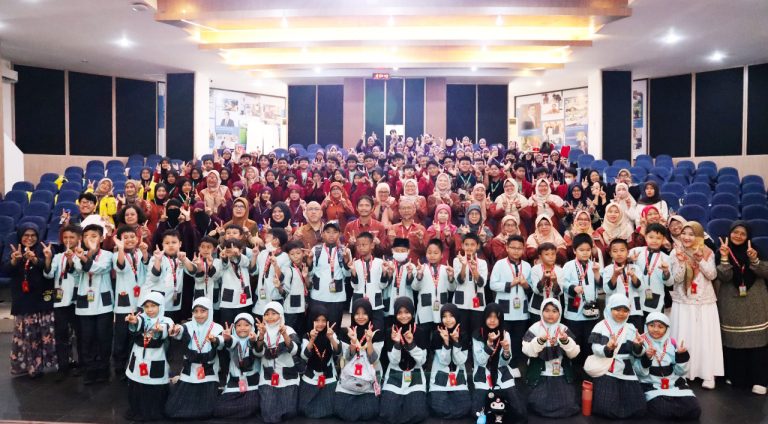
“We are very grateful to FMIPA UI, especially the Department of Biology, for giving our students the opportunity to learn biology in an engaging way. This ecoprinting activity is not just an art exercise but an effective means of fostering environmental awareness and nurturing creativity from an early age,” said Zubaidah M.P.d, Principal of SDIT Raflesia Depok.
She continued, “The children have become more familiar with different types of plants and have learned how to utilize natural resources wisely and responsibly.”
The activity was supported by several FMIPA UI lecturers, including Prof. Dr. Luthfiralda Sjahfirdi, Prof. Dr. Dra. Noverita Dian Takarina, Prof. Dr. Drs. Abinawanto, M.Si., Prof. Dr. rer. nat. Mufti Petala Patria, Dr. Windri Handayani, M.Si., Dr. Dra. Ratna Yuniati, M.Si., Dr. Mega Atria, S.Si., M.Si., Dr. Nova Anita, S.Si., M.Biomed., Dr. Dimas Haryo Pradana, S.Si., M.Si., and Dr. Upi Chairun Nisa, S.Si., M.Sc., along with students and administrative staff who assisted throughout the activity.
Through this Community Engagement program, the Department of Biology, FMIPA UI, not only introduced ecoprinting but also opened the door to a more creative and life-connected future for biology education. The entire team involved in the activity hopes that similar programs can be expanded to other schools so that more students can experience enjoyable and meaningful learning.
“Ecoprinting serves as a simple bridge toward a broader understanding that nature holds extraordinary potential. It is the duty of the younger generation to protect it. Through hands-on experiences like this, we hope to cultivate environmental awareness among young people, which will eventually inspire them to take real action,” said Dr. Oriza Savitri Ariantie, M.Si., closing the activity.
Share this:
Other News

